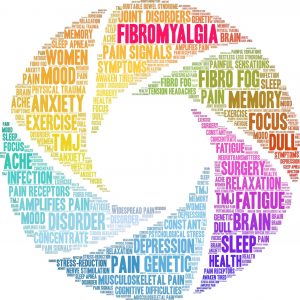What is Fibromyalgia, why do you get it, and can you get rid of it?
Fibromyalgia is a diagnosis given to a set of symptoms which usually includes widespread body pain (this can be neck & shoulders, back & pelvis, but also the arms and legs and headaches too). The pain can also be associated with a feeling of muscle tension, and tenderness in the muscles. A lack of sleep and feeling of fatigue also are core symptoms. Other feelings such as dizziness, abdominal pain, period pain and low mood are also very common. All this can obviously be highly distressing and disabling.
Research suggests that a combination of genetic and environmental factors are responsible for the development of Fibromyalgia. There is evidence to show that stressful life events can effectively change your genetic makeup such that you become more likely to operate in a constant ‘fight or flight’ mode. Environmental factors such as early life stress, prolonged periods of stress, poor sleep and either inactivity or over activity can all contribute to the development of symptoms. If this is sustained over a long period of time, the body can react by creating changes in the nervous system and immune system that result in widespread sensitivity to movement, touch, and fatigue.
Being given a diagnosis of Fibromyalgia can be quite confusing as there is lots of misinformation on the internet. Here are some corrected commonly held beliefs:
- The pain that is felt in the tissues does not mean there is damage that needs specific local treatment
- Exercise and movements that are painful should not necessarily be avoided
- Feeling tired is not an indicator that you must rest
- Treatments such as massage, or manipulation, acupuncture or injections and surgery are not effective or helpful.
- The pain is not a sign that the tissues are fragile and need protecting
- There is noW a treatment for fibromyalgia
- Opiates are not a good long-term treatment for fibromyalgia In fact the evidence points to these drugs worsening the condition.
The reason the tissues feel so sensitive is due to an increase in sensitivity throughout the nervous system. Your brain receives all sorts of information from your body, and in response to this, as well as lots of other factors (your environment, mood, thoughts, sleep state, memories, anxiety levels etc) decides whether to produce pain. This is the same for everyone. It is just that with Fibromyalgia, the brain produces more pain more easily making normal everyday movements and activities painful. This is exhausting! Fortunately, the brain is very adaptable, and can change given the right circumstances. In other words, there is a way out of Fibromyalgia – it is not for life!
So, what can be done to reduce the sensitivity within the nervous system? Adopting good lifestyle habits is a good place to start:
How important is sleep for fibromyalgia?

Good sleep habits are absolutely key to successfully reducing the pain. Life without good quality, and enough sleep can be a major driver of pain. In fact, your brain can spontaneously produce pain in a chronically sleep deprived state, without any tissue damage or strain!
Should someone with fibromyalgia exercise?
Engaging in regular movement and activity is also critical to the recovery process. This can be sore to start with, but it is safe to do so as pain is not a sign of tissue damage. As your body and nervous system adapt to the exercise and movement, levels can be progressed over time, allowing you to get back to activities and movements that you care about.
How does stress effect fibromyalgia?
The stress response is a major sensitiser of the nervous system. People often don’t realise how stressed they are, and where these stressors come from. Acknowledging the stress and learning to manage the stress and your response to it through relaxation and even meditation can help to calm the nervous system.
Changing the way, you think about things can also help to reduce your body’s response to stress.
So can you beat fibromyalgia?
Not all of these things are easy to do on your own. At physis we will go through a thorough examination to identify the drivers for your pain. We will put you through a comprehensive physical exam to exclude any serious pathology and then work with you to work on the drivers of your pain, allowing you to return to activities that are meaningful to you.
Book appointment online or call us on 0131 478 4646.
Additional Resources:
https://www.cdc.gov/arthritis/basics/fibromyalgia.htm
https://www.nhsinform.scot/illnesses-and-conditions/muscle-bone-and-joints/conditions/fibromyalgia
https://www.moodjuice.scot.nhs.uk/chronicpain.asp


